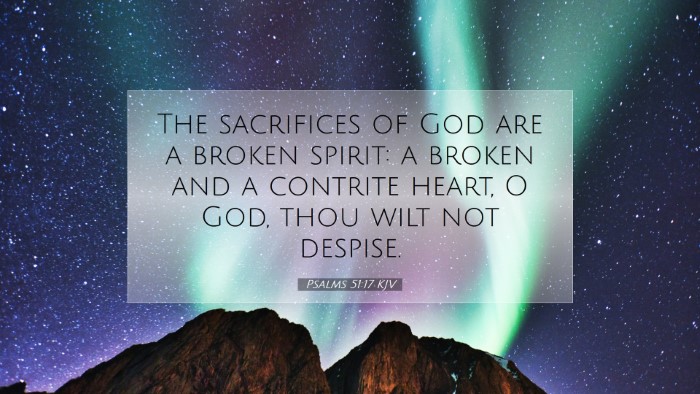Psalms 51:17 Commentary
Verse Text: “The sacrifices of God are a broken spirit: a broken and contrite heart, O God, thou wilt not despise.”
Introduction
This verse, part of David's penitential psalm, emphasizes the importance of genuine repentance before God. David, having sinned deeply, acknowledges that outward rituals of sacrifice are of little value without true internal contrition. This sentiment resonates deeply throughout Scripture, calling believers to reflect on the nature of true worship and the heart condition necessary for acceptance before the Almighty.
Contextual Overview
Psalms 51 is attributed to King David after his sin with Bathsheba and the murder of Uriah. This psalm serves as a heartfelt confession and a plea for mercy, demonstrating the depths of human sinfulness and the heights of divine grace. David’s creative expressions of sorrow and longing for restoration set the tone for understanding Psalm 51:17's profound implications.
Exegesis of Psalms 51:17
“The sacrifices of God”
David uses the term “sacrifices” to denote what God desires from His people. In the context of the Old Testament, sacrifices often referred to the physical offerings presented at the temple. However, David deviates from the traditional interpretation, indicating that God seeks more than mere ritualistic offerings.
“are a broken spirit: a broken and contrite heart”
Henry eloquently articulates that a “broken spirit” symbolizes humility and recognition of one's sinfulness. Adam Clarke adds to this by stating that a “contrite heart” is one deeply sorrowful for sin, leading to genuine repentance. It is not merely remorse but a heartfelt sorrow that leads to transformational changes in one's life.
“O God, thou wilt not despise”
Barnes emphasizes that God looks with favor upon a genuine heart of repentance. David reassures himself and the reader that God is gracious and compassionate, ready to accept those who turn to Him in sincerity. The term “despise” indicates that God does not reject the humble; instead, He cherishes such offerings.
Theological Implications
- True Worship Defined: Worship is not limited to external rituals but requires an internal heart condition. David's proclamation reshapes the understanding of worship as an act stemming from a contrite spirit.
- The Nature of Repentance: This verse teaches that true repentance goes beyond confession; it embodies a transformation of heart. A bruised spirit signifies an understanding of God’s holiness contrasted with human frailty.
- God’s Mercy: God's readiness to receive those with a broken spirit enlightens believers on the nature of divine compassion. Even the greatest sinners are within reach of God's grace if they approach Him with humility.
Practical Applications
This verse offers profound insights for modern followers of Christ. Pastors can incorporate Psalm 51:17 into their teachings to illustrate the concept of heartfelt repentance and its role in authentic worship. For students and theologians, it serves as a reminder to examine the condition of their hearts before God, emphasizing relational aspects of faith over mere ritualistic expressions.
Encouragement for the Penitent: Those who wrestle with guilt or a sense of unworthiness can take comfort in the promise that God does not despise their humble appeal. This verse is a beacon of hope, affirming that sincere, broken-hearted repentance is met with divine acceptance.
Call to Reflect: Believers are called to reflect on their attitudes toward sin and repentance. Are their hearts molded by worldly standards or God's expectations of humility? This profound introspection can lead to renewed faith and deeper communion with God.
Conclusion
Psalms 51:17 encapsulates the core of genuine repentance and the heart of worship that God desires. The insights drawn from public domain commentaries underscore a transformative understanding of sacrificial offerings—what matters to God is not just the act but the spirit behind it. As believers, embracing a broken spirit and a contrite heart invites the profound grace of God into our lives, reflecting His character and compassion.


